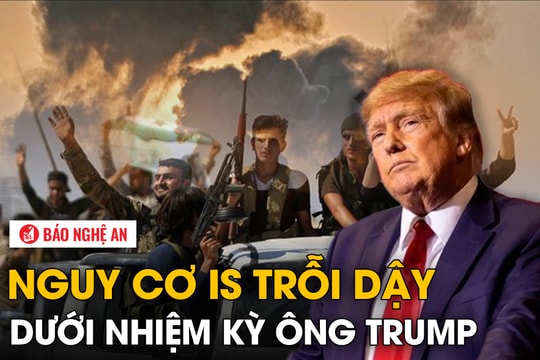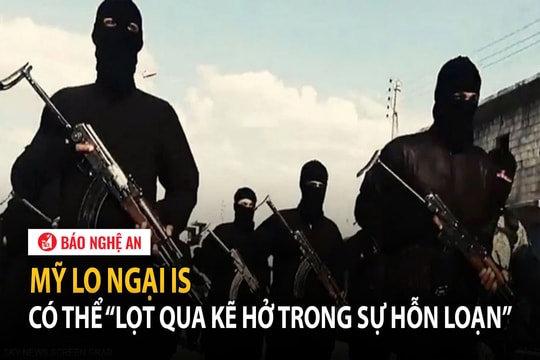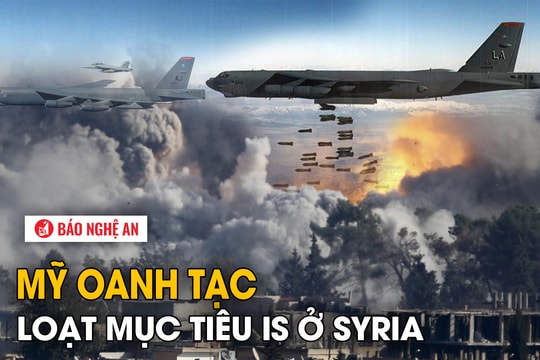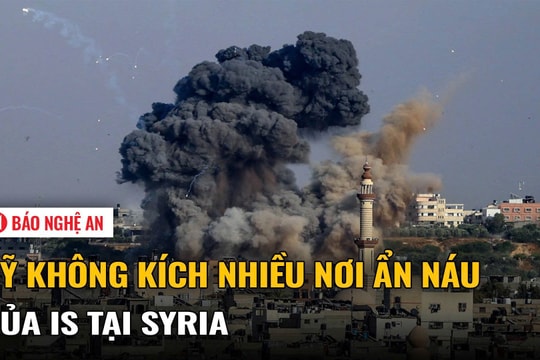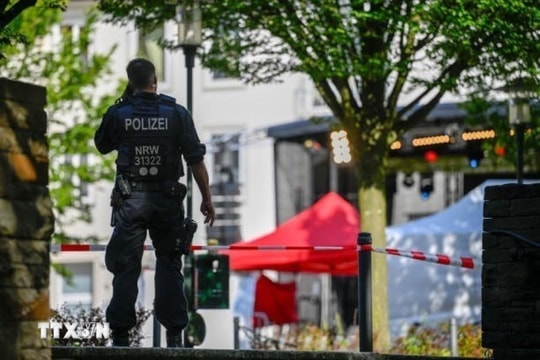US Newspaper: IS Terrorists Robbing Poor People
The New York Times (NYT) reported that IS terrorists are robbing the poor by setting up a violent bureaucratic system to extort every Syrian pound from people living in the areas they control in Syria and Iraq.
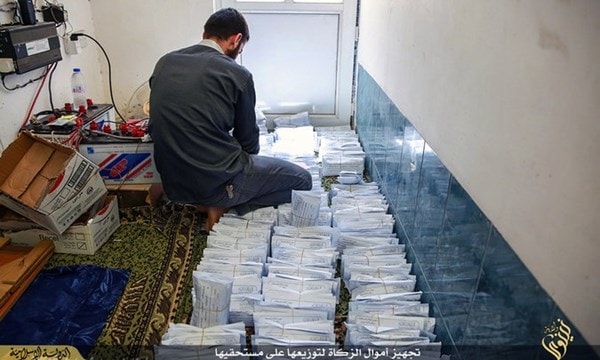 |
| IS 'tax officials' count collected cash |
According to the NYT, the terrorist organization Islamic State uses this type of extortion to achieve its goal of building a trustworthy government. They take every last Iranian dinar or dollar from those who pass through their territory.
IS sets up countless types of "taxes and fees", levied in the morning and collected in the afternoon.
Every three months, Mohammad al-Kirayfawai (38 years old) has to "donate" 300 USD to IS, to drive a refrigerated truck full of ice cream and perishable vegetables from Jordan to an area in Iraq controlled by IS.
The IS at the border post considered the money an “import tax.” They also provided a receipt with an IS stamp, logo, and seal. Kirayfawai needed this to pass through other checkpoints along the way. He said if he refused to pay, he would be arrested or have his car burned.
The Times interviewed dozens of people who escaped from IS territories, as well as Middle Eastern and Western officials who are trying to trace the group’s finances. The newspaper learned that IS collects “tolls,” “road fees,” rent for public buildings, water and electricity charges, income taxes, farm taxes, and fines for violations such as smoking and improper clothing.
Louise Shelley, Director of the Center for Counterterrorism, Transnational Crime and Corruption at George Mason University (USA), said: "In the morning they fight, and in the afternoon they collect taxes."
So far, the West has said that IS's main sources of income are crude oil smuggling, bank safe robbery, antique theft, kidnapping foreign hostages for ransom, and raising money from wealthy people in the Gulf who support IS. These funds have helped IS become the richest military organization in the world.
But as Western and Middle Eastern officials learned more about IS’s finances last year, they agreed that the biggest source of cash came from the militants’ looting of poor people and the businesses they controlled.
After the Paris attacks on the evening of November 13 that killed 130 people, the US launched a major attack on IS’s crude oil production and smuggling operations. Before this attack, the US only conducted limited bombing because it feared causing major and long-term damage to the Iraqi and Syrian economies. In November, US warplanes attacked a convoy of oil trucks in eastern Syria, destroying 116 vehicles.
But many officials and experts say IS can make up for its losses without oil sales. So as long as IS controls large swaths of Syria and Iraq—including major cities—it will take more than bombing tankers to bankrupt them.
"Please" more money because "our country is at war"
According to some European and American officials, the revenue from these “taxes and fees” totals tens of millions of USD/month, nearly 1 billion USD/year. So far, this revenue has not been affected by the embargo or the bombings by Russia and the US-led anti-IS coalition.
“Bombing is like pinpricks for ISIS unless you can stop them from making cash in the areas they control,” said Seth Jones, a terrorism expert at the RAND Corporation.
In those areas, IS uses the threat of violence to rob people and businesses. In the Bab al-Tob district of Mosul (Iraq), IS converted a 19th-century police station into a market with 60 stalls selling fruits and vegetables. The rent for each stall is 2.8 million Iraqi dinars, equivalent to $2,500.
In the IS “capital” of Raqqa, there is the “Service Department” Diwan al-Khadamat, which sends “tax officers” around the city to collect sanitation fees of 2,500 to 5,000 Syrian pounds ($7 to $14) per month, depending on the size of the stall.
Every month, Raqqa residents also gather at collection points to pay 800 Syrian pounds ($2.50) for electricity and 400 Syrian pounds ($1.20) for water.
The IS “Department of Natural Resources” Diwan al-Rikaz oversees businesses, oil production and smuggling, and the looting of antiquities. It runs soft drink and bottled water factories, textile factories, furniture factories, telephone companies, chemical factories, cement factories, and roofing tiles. It collects all the revenues of these factories. Small businesses are also required to “donate” a portion of their revenues to IS.
“We have to pay cash or olive oil, depending on the production,” said Tarek, a Syrian in Lebanon who supports Syrian President Bashar Assad’s regime. Tarek, who asked not to be named because his parents are still alive and work on the family farm on the outskirts of the IS-controlled city of Aleppo, asked not to be named.
IS “tax officials” hate the word “tax” and often use the word “zakat.” This word is equivalent to the “alms” that Muslims are required to give. According to Islamic law, the “alms” are set at 2.5% of a person’s wealth. But IS “asks” for 10% because “the homeland is at war,” according to a journalist in Raqqa who asked to remain anonymous for fear of his life, and only identified himself as Abu Mouaz.
IS also charges car registration fees and forces students to buy textbooks. It also fines drivers with broken tail lights—a practice that is hardly uncommon on the Middle East’s lawless road system.
There are also severe penalties for lifestyle violations imposed by IS. Smoking is banned, for example. Mohammad Hamid, 29, said he was caught smoking in a shop in Mosul in late August: “Not only did IS whip me 15 times in public, they also forced me to pay a fine of 50,000 dinars (about $40).” He then fled to a Kurdish-controlled part of Iraq.
Retaking IS land - the only way to stop terrorists from exploiting the poor?
Some officials estimate that IS has stolen between $800 million and $900 million from people and businesses in areas it controls, more than crude oil smuggling, which only netted them $500 million.
IS also earned about tens of millions of dollars from kidnappings, and stole about 1 billion dollars from banks - 675 million dollars in Mosul alone.
A European official, speaking on condition of anonymity because he was not authorized to discuss classified intelligence, told the NYT that IS has a relatively sophisticated financial system. In the short term, European and American officials are struggling to cut off its revenue.
The same approach used to stop the flow of Gulf financing as it did to stop al-Qaeda is unlikely. Officials say IS funnels the funds into the regional and global financial system, as there is no sign of inflation—which would be the result of a large inflow of money into a small economy. Money exchanges in southern Turkey are also a concern because they could be used to launder money, the European official said.
In the long term, the surest way to limit IS’s financial capabilities is to retake the territory it controls, U.S. officials say. That’s a difficult task, and one that’s taking place slowly despite thousands of airstrikes. “The only sure way to deny them their main source of revenue is to use military force,” said a senior U.S. government official, who spoke on condition of anonymity because he was not authorized to discuss security matters.
Followed By One World
| RELATED NEWS |
|---|

